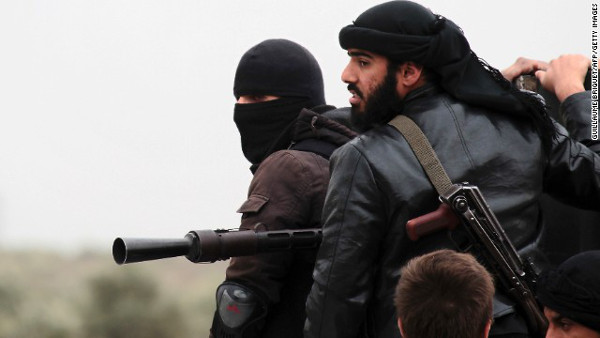
By: panarmenian.net
Source: http://www.panarmenian.net/
Al Qaeda has swept to power with the aim of imposing a strict Islamist ideology on Syrians across large swathes of Syria’s rebel-held north, according to a CNN survey of towns, activists and analysts that reveals an alarming increase in al Qaeda-linked control in just the past month.
Al Qaeda-backed militants known as the Islamic State of Iraq and Syria (ISIS) are the predominant military force in northern Syria, according to activists and seasoned observers, and have a powerful influence over the majority of population centers in the rebel-held north.
Rami Abdul Rahman, from the Syrian Observatory for Human Rights, said: “ISIS is the strongest group in Northern Syria 100% – and anyone who tells you anything else is lying.”
CNN conducted dozens of interviews with activists, local and international observers and residents of the towns affected by ISIS in preparing this study. Many of the Syrians CNN spoke to talked anonymously for fear of angering ISIS, saying ISIS has in some areas made it a crime punishable by flogging to even say their name.
Many observers explain that the extent of ISIS’s discipline and resources they are said to have considerable cash at their disposal means that the other rebel groups operating in the north do not seek to confront them.
Charles Lister, analyst at IHS Jane’s Terrorism and Insurgency Centre, said: “Although not a numerically dominant force, ISIS is playing an increasingly pre-eminent role in the northern Syrian insurgency.
“Much of this is a result of its capability to exploit superior levels of financing and resources essentially, to spread itself thinly enough to exert influence and/or control, but not too thin as to be overpowered by rivals.”
Most activists point to a clear strategy by ISIS — which aims to dominate a large swathe of the north from the north-western town of Idlib to the north-eastern city of Raqqa and beyond — of focusing on population centers on the edges of rebel-held territory and slowly choking off central areas. Some ISIS figures have described a broader aim of trying to link the Sunni province of Anbar in Iraq to the Mediterranean coast, near the Syrian town of Latakia, according to CNN.
While the main city of Aleppo remains in the control of a series of different rebel groups, ISIS has begun exerting control on key entry points into the city, and has recently gained control of the al-Sakhour neighborhood. The group is also gaining ground in controlling the northern access points to the city and territory in the rebel-held east.
ISIS’ control around Idlib, another key city, is complicated by the regime’s continued presence there, but the group has established a foothold to the north east in Sarmin, is present in the town of Saraqib, and is in full control of Binnish, a key town to Idlib’s north.
Their grip over the rebel town of Raqqa is considerably tighter than elsewhere, despite the continued presence of rival and even aligned rebel groups who do not seek to challenge them. The Washington Institute think-tank says ISIS’ grip on Raqqa makes it “the largest city al Qaeda has ever controlled in the Islamic world.”
ISIS have released a series of slickly-produced videos about their growing control, and some skeptics say they are promoting stories of their dominance to increase their power over local populations.



